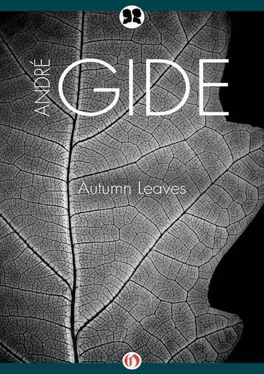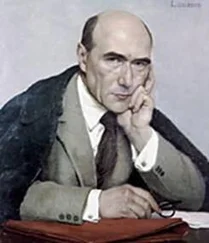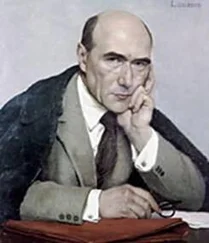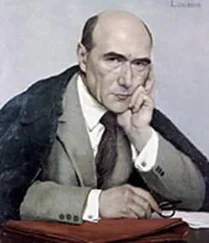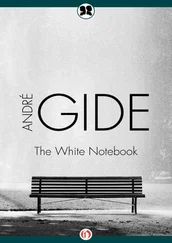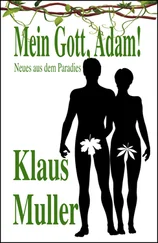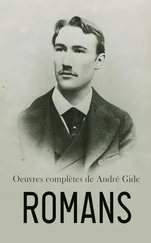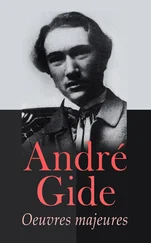Athman couldn’t stop laughing and lent himself to the game.
It was in memory of this trip that Jammes later made me a present of an extraordinary cane. He had gotten it himself, I believe, from an old shepherd in the Pyrenean foot-hills. Cut from an extremely hard wood, it ended in a dog’s head, roughly carved. Jammes had carved on it with a knife, in capital letters, the following lines:
A bee sleeps
On the heather of my heart.
A squirrel had a
Rose in its mouth. A donkey
Treated him like a fool.
A nightingale loved a wasp
He ate her with a kiss.
The first two lines appear as an epigraph printed at the head of his letters of 1894.
I have guarded the cane preciously. It is there in the corner of my room. I can not see it without reliving the past. It helps me bring back to life a figure who was dear to me, a friend whom I have never entirely lost.

1 The poor, gentle dominie, so dirty, said to me: “My eyes hurt so much, and my right arm is paralysed.” He economises to have himself treated .… Translator’s note.
1“A bird in the hand is worth two in the bush.” Literal translation: “One good thing you have is worth more than two things you will have.” Translator’s note.
9 THE RADIANCE OF PAUL VALÉRY
PAUL VALÉRY’s death does not grieve France alone; from the entire world goes up the lamentation of all those whom his voice could reach. The work remains, it is true, as immortal as a human work can claim to be, and one whose radiance will continue to spread out across space and time. I leave to others the care of eulogizing this imposing work, capable of instructing and fertilizing the most distant minds and the most diverse; that prose and verse of a severity, plenitude and beauty so perfect that they force admiration and can be compared only to the purest jewels of our literature. It is of the man himself I would speak; of what Paul Valéry was. In him I am losing my oldest friend. A friendship of more than fifty years, without lapses, clashes or breaks and, such, in a word, as doubtless we deserved, different as we were from each other. Even though confessions were distasteful to him and he held the particular and individual in considerable scorn, without doubt he would pardon me for permitting to-day the expression of my personal grief. Since he considered that, as a general thing, he should reveal only his thought to the world, many people found it possible to misunderstand him, and see in him only a prodigious intelligence, bringing everything and everybody into action without committing or permitting himself to be moved or touched by anything.… His reticence in regard to his sentiments was extreme, and his reserve; to such an extent that he himself scarcely seemed to suspect what his exquisite sensibility, what the qualities of his heart contributed in the way of secret quivering even in his most noble lines. And it was also those qualities of heart, that affectionate attention, even at times that tenderness, which made Valéry’s friendship so precious. As for the rest, that intellectual treasure, I shall find all that again in his books; but his smile, so affectionate as soon as he had ceased to be ironical, his look, certain inflections of his voice, almost caressing, well, all that is nothing more now than a memory.
At the beginning of May 1942, on the point of embarking for Tunis, I had the joy of seeing Valéry again; he had come to join me at Marseilles. He who, so often, in Paris, weighed down’ by cares, duties and obligations, gave evidence of a painful fatigue, appeared to me, during those two days of sun and holiday we spent together, rested, as though rejuvenated, in full possession of his worth, more alive, more loving, more expansive than in the best times of his youth. An extraordinary gaiety animated his eloquent remarks, and I remained dazzled by the resources of his intelligence, charmed by his ease and affectionate grace.
When, after my three years’ exile in North Africa, I was finally able to reach France, I found Paul Valéry again, older than I had allowed myself to expect. “I am at the end of my rope,” he said to me, secretly attacked by the disease that soon became evident. Stomach ulcers, hemorrhages, pulmonary congestion … for a month in bed, penicillin, blood transfusions; the most constant care of those nearest to him only succeeded in prolonging the atrocious pains. The few times I was able to see him again, the suffering imprinted on his features made him almost unrecognizable. At the time of my next to the last visit, he kept me a long time at his bedside, one of my hands held tightly between both of his, as though he expected from that contact a sort of mystical transfusion. He made an effort to speak to me and, for a long time leaning over him, I made an effort to understand him, but could not, alas! get anything from his mouth but indistinct words. He had, nevertheless, kept his perfect presence of mind; and a few days sooner, was still taking some pleasure, some comfort at least, in reading; a huge bound volume lay on his bed; it was Voltaire’s Essay on the Spirit and Customs of Nations; of that Voltaire of whom he said, at the Sorbonne, the 10th of December, 1944: “He is the man of highest intelligence, the most subtle of humans, the most ready, the most awake … possessing, up to the last day, springs of reactivity seemingly inexhaustible.” Did he think as he wrote this that those words could be just as well applied to him?
I still read in that very last lecture of Valéry’s these sentences in which, painting Voltaire, he paints himself: “Everything excites his desires to know, to reduce, to combat; everything is food for him and serves to feed that fire, so clear, so bright, where a perpetual transmutation is at work … where the genius of disassociation resolves every appearance of truth that drags on into the century and which still imposes itself on the indolence of the minds.”
O least indolent of beings! you, animated, both by that “genius of disassociation,” and by a splendid poetic genius that did not visit Voltaire at all, you fought ceaselessly with the loyal arms of the Mind alone, for durable and pacific victories. While shadows besiege us on all sides, through you France spreads a radiance over the world; and what you bring to the world can not be taken from us.
NOTHING could do more or better honor to our provisional government than those glorious obsequies given officially, with ceremonies worthy of the most eminent representative of the French genius, to Paul Valéry, whose radiance maintains the primacy of our country over the spiritual world in spite of our historic reverses and our misfortune.
This recognition was all the more remarkable and surprising, for the signal worth of Paul Valéry escapes popular favor. That he has been, indirectly and as though he did not wish it, of immense service to France, is something that could only be appreciated by a very small number. His activity, disinterested in public affairs, exercised itself in a restricted domain, indifferent to events, but where, unknown to us, our destinies play. “Events bore me,” he said. “Events are the froth of things. It is the sea that interests me. It is in the sea that one fishes; it is on it that one sails; it is in that one dives.…”
And no one dove deeper.
* * * *
From his youth a secret ambition activates him, of such a nature that I can not imagine a more noble one; in comparison with it, Balzac’s heroes make us smile. On the secular or worldly plane, where the game is played for the latter, Valéry will succeed moreover and, furthermore, better than any of them; he knows how honors are obtained, what they are worth, and what they cost in peace of mind. He will accept the price, if it should only be to show others and to prove conclusively to himself that there is nothing there he can not attain; a matter of earning the right to scorn all that. For he has a tendency to despise everything; that is his strength. The domination he wishes is something entirely different; it is that of the mind. The rest appears laughable to him. To dominate not the mind of others but his own; to get acquainted with its functioning, make himself master of it in order to dispose of it at his will, it is to that he continuously applies his effort. Curious Narcissus; to dominate the mind by the mind. From then on the result hardly matters to him; the product, no, but the means to obtain it; when he wishes, as he wishes, to be capable of.… “My nature is potential,” he said. It is fortunate for us that Valéry thought he should apply his method to literary ends; now, he said: “It is in the domain of Letters I could exist the most easily.” But from then on he will consider his most admirable poems, his most accomplished prose essays, as the “Q. E. D.” of exercises 1—that is how he designates his Jeune Parque (Young Fate), — and as for that supreme method he applies to it, I do not doubt he would have been able to exercise it in all other fields with just as victorious results. Yes, I imagine Paul Valéry an equally great statesman, great diplomat, financier, man of science, engineer or doctor. And I happen even to doubt if he would not have been able to excel in architecture, in painting or in music, as he did in poetry, although it requires particular gifts, but ones that Valéry possessed almost equally.
Читать дальше
